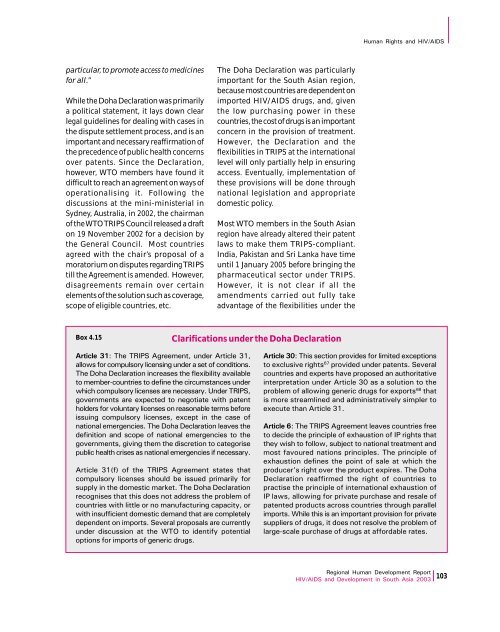Download Report - UNDP Asia-Pacific Regional Centre - United ...
Download Report - UNDP Asia-Pacific Regional Centre - United ...
Download Report - UNDP Asia-Pacific Regional Centre - United ...
You also want an ePaper? Increase the reach of your titles
YUMPU automatically turns print PDFs into web optimized ePapers that Google loves.
Human Rights and HIV/AIDSparticular, to promote access to medicinesfor all.”While the Doha Declaration was primarilya political statement, it lays down clearlegal guidelines for dealing with cases inthe dispute settlement process, and is animportant and necessary reaffirmation ofthe precedence of public health concernsover patents. Since the Declaration,however, WTO members have found itdifficult to reach an agreement on ways ofoperationalising it. Following thediscussions at the mini-ministerial inSydney, Australia, in 2002, the chairmanof the WTO TRIPS Council released a drafton 19 November 2002 for a decision bythe General Council. Most countriesagreed with the chair’s proposal of amoratorium on disputes regarding TRIPStill the Agreement is amended. However,disagreements remain over certainelements of the solution such as coverage,scope of eligible countries, etc.The Doha Declaration was particularlyimportant for the South <strong>Asia</strong>n region,because most countries are dependent onimported HIV/AIDS drugs, and, giventhe low purchasing power in thesecountries, the cost of drugs is an importantconcern in the provision of treatment.However, the Declaration and theflexibilities in TRIPS at the internationallevel will only partially help in ensuringaccess. Eventually, implementation ofthese provisions will be done throughnational legislation and appropriatedomestic policy.Most WTO members in the South <strong>Asia</strong>nregion have already altered their patentlaws to make them TRIPS-compliant.India, Pakistan and Sri Lanka have timeuntil 1 January 2005 before bringing thepharmaceutical sector under TRIPS.However, it is not clear if all theamendments carried out fully takeadvantage of the flexibilities under theBox 4.15Clarifications under the Doha DeclarationArticle 31: The TRIPS Agreement, under Article 31,allows for compulsory licensing under a set of conditions.The Doha Declaration increases the flexibility availableto member-countries to define the circumstances underwhich compulsory licenses are necessary. Under TRIPS,governments are expected to negotiate with patentholders for voluntary licenses on reasonable terms beforeissuing compulsory licenses, except in the case ofnational emergencies. The Doha Declaration leaves thedefinition and scope of national emergencies to thegovernments, giving them the discretion to categorisepublic health crises as national emergencies if necessary.Article 31(f) of the TRIPS Agreement states thatcompulsory licenses should be issued primarily forsupply in the domestic market. The Doha Declarationrecognises that this does not address the problem ofcountries with little or no manufacturing capacity, orwith insufficient domestic demand that are completelydependent on imports. Several proposals are currentlyunder discussion at the WTO to identify potentialoptions for imports of generic drugs.Article 30: This section provides for limited exceptionsto exclusive rights 67 provided under patents. Severalcountries and experts have proposed an authoritativeinterpretation under Article 30 as a solution to theproblem of allowing generic drugs for exports 68 thatis more streamlined and administratively simpler toexecute than Article 31.Article 6: The TRIPS Agreement leaves countries freeto decide the principle of exhaustion of IP rights thatthey wish to follow, subject to national treatment andmost favoured nations principles. The principle ofexhaustion defines the point of sale at which theproducer’s right over the product expires. The DohaDeclaration reaffirmed the right of countries topractise the principle of international exhaustion ofIP laws, allowing for private purchase and resale ofpatented products across countries through parallelimports. While this is an important provision for privatesuppliers of drugs, it does not resolve the problem oflarge-scale purchase of drugs at affordable rates.<strong>Regional</strong> Human Development <strong>Report</strong>HIV/AIDS and Development in South <strong>Asia</strong> 2003 103
















